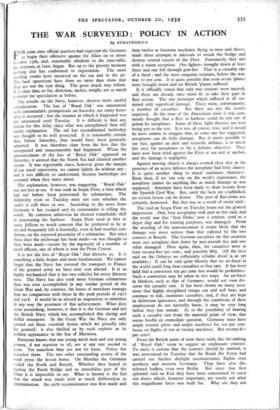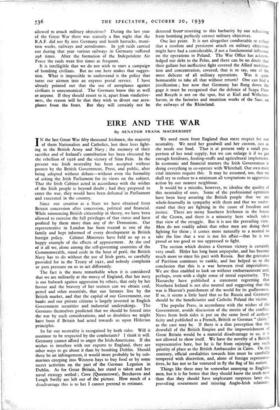THE WAR SURVEYED: POLICY IN ACTION
By STRATEGIC U S
V OR some time official quarters had expected the Germans r to begin their offensive against the Allies on or about 0..tober t5th, and, reasonably obedient to the time-table, the overture, at least, began. But up to the present moment nothing else has conformed to expectation. The most startling events have occurred on the sea and in the air. The land operations have done no more than show that they are not the real thing. The great attack may follow. It is clear that, so far, direction, tactics, weight, are as much a matter for speculation as before.
The attacks on the Navy, however, deserve more careful consideration. The loss of Royal Oak' was announced with commendable promptitude on Saturday not many hours after it occurred ; but the manner in which it happened was not announced until Tuesday. It is difficult to find any reason for this delay since what was unexplained then still awaits explanation. The old but reconditioned battleship was thought to be well protected. It is reasonably certain that, before Saturday, that would have been generally admitted. It was therefore clear from the first that the unexpected and unaccountable had happened. When the announcement of the loss of Royal Oak' appeared on Saturday, it seemed that the North Sea had claimed another victim. It was regrettable since, however great the margin of our naval superiority, we cannot lightly do without any ; and it was difficult to understand, because battleships are screened when they move about.
The explanation, however, was staggering. Royal Oak' was not lost at sea. It was sunk in Scapa Flow, a base which had not before been penetrated by submarines. The Admiralty even on Tuesday were not sure whether the raider is still there or not. According to the news from Germany it has escaped and its commander is telling the world. By common admission he showed remarkable skill in penetrating the harbour. Scapa Flow used at first to cause Jellicoe so much concern that he preferred to be at sea and frequently left it hurriedly, even in bad weather con- ditions, on the reported proximity of a submarine. But since those days the anchorage has been made—or was thought to have been made—secure by the ingenuity of a number of naval officers, one of whom is now the Press Censor.
It is not the loss of Royal Oak' that disturbs us. It is something a little deeper and more fundamental. We cannot forget that the Navy has covered the transport to France of the greatest army we have ever sent abroad. It is so highly mechanised that it has two vehicles for every thirteen men. The Navy has also sunk more German submarines than was ever accomplished in any similar period of the Great War and, by contrast, the losses of merchant tonnage bear no comparison with those in the peak periods of 1917 and 1918. It would be as absurd as ungracious to minimise in any way the greatness of this achievement. What does seem astonishing, however, is that it is the German and not the British Navy which has accomplished this daring and skilful enterprise. In the Great War the Navy not only carried out those essential duties which we proudly take for granted : it also thrilled us by such exploits as its sudden appearance in the Sea of Marmora.
Everyone knows that our young naval men and our young airmen, if not superior to all, are at any rate second to none. Yet somehow they are not let loose. Policy has muzzled them. The two other outstanding events of the week press the lesson home. On Monday the Germans raided the Forth and Rosyth. Whether they hoped to destroy the Forth Bridge and so immobilise part of the Fleet it is impossible to say. What is known is the fact that the attack was made with as much deliberation as determination. An early reconnaissance was first made and then twelve or fourteen machines, flying in twos and threes, made three attempts at intervals to wreck the bridge and destroy several vessels of the Fleet. Fortunately they met with a warm reception. Our fighters brought down at least three and one fell through gun-fire. That is a casualty race of a third ; and the most sanguine estimate, before the war, was to per cent. It is quite possible that even seven 'planes were brought down and no British 'planes suffered.
It is officially stated that only two cruisers were injured, and these are already once more fit to take their part in fleet action. The one destroyer which suffered at all sus- tained only superficial damage. There were, unfortunately, a number of casualties. But these are not the results expected. At the time of the Abyssinian crisis it was com- monly thought that a fleet in harbour could be put out of action by aeroplanes. Some of these light theories are now being put to the test. It is not, of course, true, and it would be most unwise to imagine that, as some one has suggested, aeroplanes can do little damage. But it seems possible to say that, against an alert and scientific defence, it is much less easy for aeroplanes to hit a definite objective. They have now been tried against the Fleet at sea and at anchor, and the damage is negligible.
Against moving objects it always seemed clear that in the presence of an active defence the aeroplane had little chance. It is quite another thing to attack stationary objectives. Even then, if we can rely on the week's experience, the aeroplane cannot do anything like as much damage as was supposed. , Attempts have been made to draw lessons from the Spanish Civil War. But, until the facts are established, no certain lesson can be drawn. The port of Barcelona was certainly destroyed. But that was as a result of many raids.
The raid on Scapa Flow on Tuesday bears out the general impression. Only four aeroplanes took part in this raid, and the result was that 'Iron Duke,' now a veteran, used as a depot ship and for training purposes, was damaged. From the wording of the announcement it seems likely that the damage was more serious than that suffered by the two cruisers at Rosyth. The German casualties on this occasion were one aeroplane shot down by anti-aircraft fire and one other damaged. Here again, then, the casualties were at least twenty-five per cent., and possibly fifty. (Of the later raid on the Orkneys no sufficiently reliable detail is as yet available.) It can be said quite bluntly that no air-force in the world could long bear casualties at that rate. It has been held that a consistent ten per cent. loss would be prohibitive. Such a contention may be taken in two ways. An air-force in blinkers, such as that of Germany, would not soon dis- cover the casualty rate. It has been shown on many occa- sions that highly disciplined troops can and will bear, and continue to risk, enormous casualties, and, if they are kept in deliberate ignorance, and through the conditions of their employment do not naturally know, it may be very long before they lose morale. As to the possibility of bearing such a casualty rate from the material point of view, that seems hardly an immediate question. Germany must have ample trained pilots and ample machines for ten. per cent. losses on flights of ten or twenty machines. But twenty-five per cent?
From the British point of view these raids, like the sinking of Royal Oak,' seem to suggest an unpleasant contrast. To make it certain that the contrast should be marked, it was announced on Tuesday that the Royal Air Force had carried out further daylight reconnaissance flights over northern and western Germany. They have also dis- tributed leaflets, even over Berlin. But since that first splendid raid on Kid they have been constrained to carry out duties which, however important, are surely not what this magnificent force was built for. Why are they not allowed to attack military objectives? During the last year of the Great War there was scarcely a fine night that the R.A.F. did not fly into Germany and bomb barracks, muni- tion works, railways and aerodromes. In 356 raids carried out during that year various railways in Germany suffered 296 times. After the formation of the Independent Air Force the raids were five times as frequent.
It is intelligible that we do not wish to start a campaign of bombing civilians. But no one here makes that sugges- tion. What is impossible to understand is the policy that turns our airmen into an express postal service. I have already pointed out that the use of aeroplanes against civilians is uneconomical. The Germans know this as well as anyone. If they should resort to it, apart from vindictive- ness, the reason will be that they wish to divert our aero- planes from the front. But they will certainly not be deterred from' resorting to this barbarity by our refraining from bombing perfectly correct military objectives.
One last point. It is not altogether comfortable to reflect that a resolute and persistent attack on military objectives might have had a considerable, if not a fundamental influence on the operations in Poland. The War Office has acknow- ledged our debt to the Poles, and there can be no doubt that their gallant but ineffective fight covered the Allied mobilisa- tion and concentration, covered, that is to say, one of the most delicate of all military operations. Was it quite honourable to take all that without return? One can find a justification ; but now that Germany has flung down the -gage it must be recognised that the defence of Scapa Flow and Rosyth is not on the spot, but at Kiel and Wilhelms- haven, in the factories and munition works of the Saar, on the railways of the Rhineland.













































 Previous page
Previous page